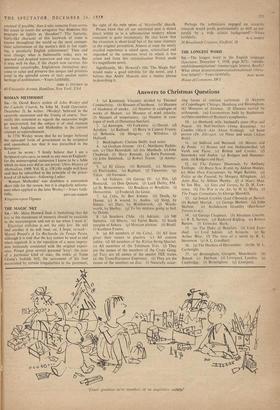THE MAGIC NET SIR,—ME. Miles Howard finds it 'tantalising that
the key to the storehouse of memory should he available to the neurosurgeon and not to me when I want it.'
Electrical stiriMlus is not the only key. He will find another if he will read—or, I hope, re-read- Marcel Proust's A La Recherche du Temps Perdu, although it is true that the key cannot be used as and when required. It is the repetition of a sense impres- sion intimately associated with the original experi- ence. Proust gives several personal 'keys; the taste of ,1 particular kind of cake, the tinkle of Tante 1 (ionic's bedside bell, the movement of his foot occasioned by certain irregularities in the pavement,
the sight of the twin spires of 'Martinville' church.
Proust knew that all our emotional past is stored intact within us in a subconscious memory whose evocation is quite involuntary. He also knew that the evocation is short-lived but of the same intensity as the original perception. Almost at once the newly recalled experience is seized upon, rationalised and expanded at the conscious level to which it has arisen and from this rationalisation Proust made his magnificent novel.
Significantly, Mr. Howard's title 'The Magic Net' would make a good sub-title for the novel, and I believe that Andre Maurois uses a similar phrase in describing it.
Perhaps the technicians engaged on scientific research would profit professionally as well as cul- turally by a wide artistic background?—Yours faithfully, H. G. HAMEY 34 Brook lands Crescent, Sheffield, 10


























 Previous page
Previous page